How Billionaire Trump Adviser Evades Ethics Law While Shaping Policies That Make Money For His Wall Street Firm
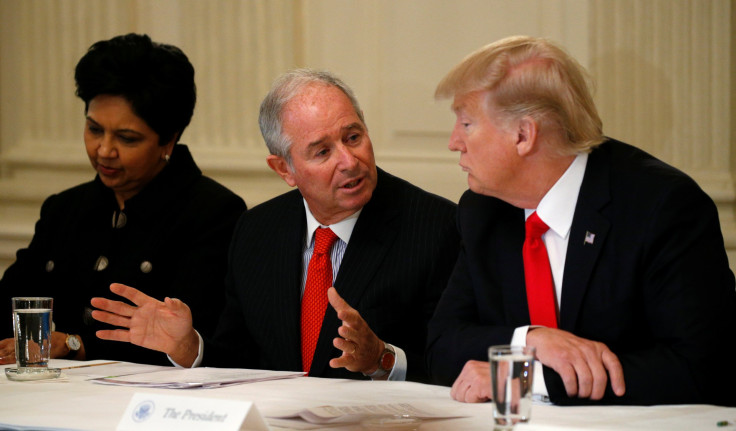
As Donald Trump develops his economic policy, Blackstone CEO Stephen Schwarzman has emerged as one of the new president’s most influential advisers — one who has boasted of his work shaping the administration’s agenda. An International Business Times review of Trump policies and Blackstone investments show that Schwarzman’s rise to political prominence has coincided with recent White House moves that could enrich his company. The moves that help Blackstone have occurred while Schwarzman has been able to simultaneously sculpt federal policy and circumvent conflict-of-interest laws.
In recent weeks, Trump has moved to halt a Department of Labor rule that could complicate Schwarzman’s dream of expanding Blackstone’s business into the multi-trillion-dollar market of retail retirement savings products. Trump has also promised to roll back Dodd-Frank regulations passed in the wake of the financial crisis — a cause Blackstone has lobbied on and that could benefit the larger private equity industry.
Read: Donald Trump’s Economic Team Packed With Corporate Lobbyists And Koch Brothers Allies
The Trump administration has also — just when Blackstone has taken steps to move into infrastructure investing — floated infrastructure investment concepts that could direct government spending through Wall Street intermediaries. And as Blackstone has worked to expand its investments in oil and gas drilling, the new administration is preparing to try to loosen environmental regulations that restrict fossil fuel exploration.
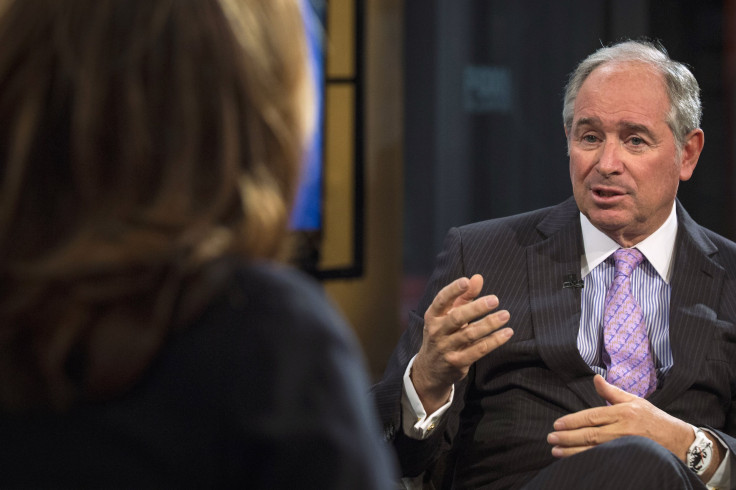
Meanwhile, even though Trump campaigned on a promise to end a special “carried interest” tax break that enriches private equity executives like Schwarzman, the White House has yet to offer such a plan — or endorse existing legislation to end the tax break.
Schwarzman declined to answer International Business Times’ questions.
Schwarzman has long been a fixture in Republican politics. The private equity billionaire has routinely been one of the party’s top donors: In the last election cycle alone, he pumped $4.8 million into Republican-aligned super PACs, according to data compiled by the nonpartisan Center for Responsive Politics. He has also touched off political firestorms, at one point likening the Obama administration’s Wall Street policies to the Nazi invasion of Poland.
Schwarzman has forged strong political and personal ties to the new White House. Trump in December said he aimed to meet “frequently” with Schwarzman, and he appointed the billionaire to chair the White House’s business advisory council — a panel of corporate CEOs regularly advising the president. A week after the council’s first meeting, Schwarzman hosted a lavish birthday party for himself — which observers speculated cost as much as $20 million — near Trump’s Palm Beach resort, and many top Trump administration officials were in attendance.
The extent of Schwarzman’s involvement in overseeing Trump administration policy was on display last week. During a White House event, he said his team met with Cabinet secretaries who presented their agenda to his council. Schwarzman said his group has been “working together” with the administration on various policy issues — many of which intersect with Blackstone’s business.
Despite Schwarzman’s formal policy role in the Trump White House, he is not technically on the White House payroll. The Trump administration appears to be interpreting that status to mean he is not subject to strict ethics and conflict-of-interest laws designed to prevent public officials from working on matters in which they have a financial interest. Under that interpretation, Schwarzman is free to advise Trump on the federal policies that govern — and can enrich — his company.
“We’ve never seen this type of abuse of the ethics laws,” said Craig Holman of Public Citizen, which has pressed for tougher conflict-of-interest rules. “Trump is bringing in these wealthy, conflicted CEOs who do not want to abide by the ethics rules and divest themselves from their financial interests. So he has just created out of thin air that they are informal advisers and are therefore immune from the ethics rules. But the fact is, these are consistent advisers — these aren’t people joining a federal advisory committee and offering occasional advice. These are people who have the direct ear of the president on a regular basis. They should be classified as special government employees, but they aren’t.”
‘We’re Getting Rid Of Your Regulations’
Blackstone is one of the largest players in the world of so-called alternative investments. The catch-all term describes an asset class comprised of private equity firms, hedge funds, venture capital and real estate that tend to be riskier and incur higher fees than traditional stocks and bonds. In recent years, the industry has faced intensifying criticism of its fees. The industry has also been questioned about whether it generates adequate returns in exchange for those levies, and about its penchant for secrecy when investing the public’s money.
That public money is a big part of Blackstone’s business. The company is built on managing — and earning big fees from — giant pools of cash from institutional investors such as public pension funds and endowments. By one 2011 estimate, nearly 40 percent of Blackstone’s assets under management come from state and local pension systems.
In recent years company officials have yearned to break into the retail business of managing more of the $7 trillion in Americans’ Individual Retirement Accounts and the trillions more in their 401(k) plans.
“In life you have to have a dream,” Schwarzman told Blackstone investors in a January call first reported by The Intercept. “One of our dreams is our desire and the market’s need to have more access at retail to alternative asset products.”
During the same call, Blackstone president Tony James put it even more bluntly, saying that for private equity firms, “the really big, vast, vast untapped territory is the $27 trillion that’s in 401(k)'s that we as an industry don’t sell anything into.”
One potential roadblock to that untapped territory had been the Obama administration’s planned fiduciary rule, which would require financial advisers to prioritize their clients’ best interests. In February, Trump signed an executive order directing the Labor Department to begin delaying the rule.
The day Trump issued the order he assured Schwarzman, “We're getting rid of your regulations.” The move was a long-sought victory in general for the alternative investment industry that Schwarzman’s firm dominates. It was also a win specifically for Blackstone itself: In February, the company warned its shareholders that the Obama rule “if implemented, could have an adverse effect on the distribution of our products to certain investors.”
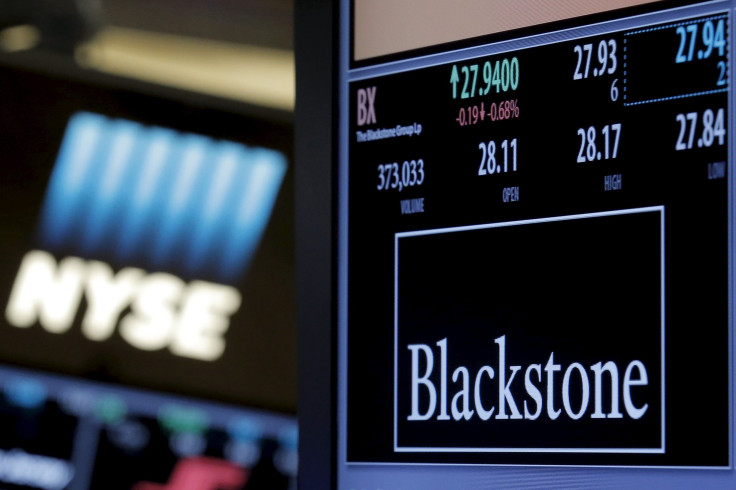
Lobbying groups representing the industry sounded alarms about the rule when it was proposed in 2015. One Blackstone-sponsored group, the Managed Funds Association, declared that “we remain concerned that the proposed rule has the potential to extend fiduciary obligations too far.” Another group that Blackstone has supported, the Alternative Direct Investment Securities Association (ADISA), demanded the administration withdraw the rule, saying it would limit financial advisers’ ability to offer their clients alternative investment products — a situation that would complicate Blackstone’s efforts to access the retail market that Schwarzman covets.
Lawyers who advise Wall Street firms told IBT that the alternative investment industry is generally opposed to how the fiduciary rule would add a whole new regulatory agency — the Department of Labor — to the oversight the industry faces. The industry’s opposition also stems from how the rule’s specific compliance standards — and its threat of lawsuits — could pressure brokers to avoid pitching retail customers on investments in private equity firms, hedge funds and other more complex vehicles.
One set of provisions in the rule, for instance, creates new requirements for brokers who sell alternative investments to more diligently document how those investments’ higher fees are “reasonable.” For a private equity industry that makes billions by charging an annual 2 percent management fee — and keeping 20 percent of its investors’ profits — the “reasonable” requirement could be problematic, especially when those fee rates are compared with far cheaper index funds that have often outperformed their competitors.
Other provisions would compel brokers to more transparently document and justify the fees associated with investing in private equity firms, which have fought to keep such information hidden from view.
Meanwhile, because the fiduciary rule bars brokers who offer alternative investments from requiring clients to sign away their rights to join class action lawsuits, Wall Street lawyers say brokers could face more such suits if they push their clients into investments like private equity. Aggrieved investors, they assert, would be able to argue that brokers promoting high-fee investments violated their new fiduciary duty to protect their clients’ best interests.
“The industry is looking at a potential enormous liability problem,” said John Grady, a partner at DLA Piper who is the president of ADISA. “The way it is drafted, there is a no-room-for-error standard and it is expected that the whole area will be policed by private lawsuits brought against firms that will be forced in hindsight to defend all the things they did.” Under the rule, Grady added, investors could be empowered to “find a flaw and effectively get their money back on the theory that it was a conflicted sale and wasn’t made in accordance with the standard.”
The rule’s “impartial conduct” standard means the threat of investor lawsuits could be particularly acute if brokers are being paid bigger commissions by private equity firms and hedge funds for offering their products over more inexpensive investments.
“It is going to be difficult to demonstrate that you gave advice in the best interest of your client if you are systematically recommending an alternative investment fund more often, and if that fund is paying you a higher fee than other investment options,” said Joshua Lichtenstein, an attorney at Ropes & Gray, in an IBT interview about the potential effect of the rule on the alternative investment industry as a whole. “And so there is pressure on fees as a result.”
Ultimately, said Grady, the rule could prompt brokers to avoid offering high-fee, high-risk alternative investments to IRA clients “because the alternatives present the most issues under the rules with their complexity and their higher cost and higher commission levels.”
Better Markets, an advocacy group that has pushed the rule, said the alternative investment industry’s entire rationale for opposing the rule demonstrates why the regulations are needed in the first place.
“They can offer all the products and services they want as long as they are putting their clients’ best interests first — if they don’t, they are by definition enriching themselves by putting their interests above their clients’ interests,” Better Markets’ Dennis Kelleher told IBT. “If that ‘disincentivizes’ them from offering ‘high fee’ products, which cannot be that ‘good’ for the clients anyway, then that is a benefit not a detriment of the law. Protecting clients’ best interests — not industry profits and high fees — is the point of the rule.”
One week after Trump’s executive order delaying the fiduciary rule, Blackstone announced the purchase of a 401(k) accounting company — a move some financial experts viewed as a step by the company to redouble its efforts to enter the retail market.
If Blackstone and other private equity firms are successful in their retail efforts — and if Schwarzman persuades the Trump administration to fully scrap the fiduciary rule — the private equity industry could hit paydirt. The trade publication Infrastructure Investor recently estimated that if the fiduciary rule is scrapped, “around $476 billion could be ploughed into private equity funds.”
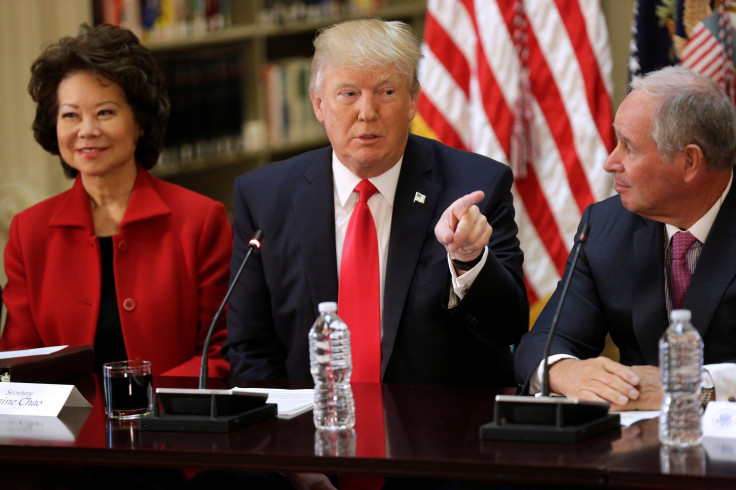
“Private Equity Firms Could Go Back Into The Shadows”
Schwarzman has been an outspoken critic of the Dodd-Frank regulations enacted after the 2008 financial crisis. In 2015, he published a Wall Street Journal op-ed declaring that “politicians and regulators constructed an expansive and untested regulatory framework that will have unintended consequences.” In 2016, during a discussion of dysfunctional credit markets, he said, “for all of you Dodd-Frank lovers, here's what happens when you have a commitment to regulation and reform, and you don't quite understand all of the implications.”
Less than a year later, Schwarzman was convening a meeting of his White House council — and Trump was signing an executive order designed to begin rolling back the legislation.
It was another win for Schwarzman’s company, which mounted an aggressive lobbying campaign to change the law. Through firms like Harbinger Strategies LLC and Capitol Counsel LLC, Blackstone has spent hundreds of thousands on such efforts, according to federal records reviewed by IBT. That was in addition to the lobbying by Blackstone-affiliated industry groups. Since Dodd-Frank passed in 2010, two Blackstone-sponsored groups — the Managed Funds Association and the American Investment Council — have listed $39 million worth of lobbying expenditures on disclosure forms that say the groups were specifically lobbying on Dodd-Frank.
While Schwarzman has publicly criticized the Dodd-Frank bill for increasing the amount of capital that banks must hold in reserve, the law has sparked frustration in the private equity world mainly for forcing the firms to register with the Securities and Exchange Commission and disclose more information about their operations.
“Dodd-Frank has caused small and midsize private equity firms to divert resources from investing activities to navigating the Act’s complex regulatory framework,” wrote Gary Labranche, president of the Association for Corporate Growth, a trade group that lobbies for the private equity industry’s priorities. “Like the grade school bully who took your lunch money, Dodd-Frank forced private equity to reallocate resources meant for generating returns for investors and their beneficiaries, to complying with the Act’s overregulation.”
For Blackstone, Dodd-Frank has coincided with intensifying law enforcement scrutiny. The company in 2015 faced an SEC investigation into secret fees that the agency said “essentially reduced the value of the portfolio companies” that Blackstone managed on behalf of investors. According to SEC regulators, Schwarzman’s firm would buy up smaller companies with its investors’ money, and then charge those companies fees without adequately disclosing the levies — a move that enriched Blackstone executives while stripping value from Blackstone investors’ assets.
The agency sanctioned Schwarzman’s firm over the practice — one of a series of cases the SEC brought against private equity firms after the financial regulation legislation. Blackstone opted to stop charging such fees.
The case illustrated just one of the ways that Dodd-Frank legislation curtailed private equity abuses, according to Center for Economic and Policy Research senior economist Eileen Appelbaum. She published a study in January 2015 noting that the new reporting requirements enabled “SEC regulators to identify widespread abuses” in the private equity industry, including “manipulating the value of companies in their fund’s portfolio, waiving their fiduciary responsibility to investors (including pension funds), misallocating PE firm expenses and inappropriately charging them to investors” and failing to share profits with the firm’s investors.
In 2016, the Republican-led House considered legislation to begin rescinding parts of Dodd-Frank: specifically, the bill proposed to reduce some of the reporting requirements for the private equity industry.
Federal records reviewed by IBT show two Blackstone-linked groups — the American Investment Council and the Investment Adviser Association — lobbied on the bill. According to the Center for Responsive Politics, donors from private equity and investment firms that year delivered more than $680,000 to House Speaker Paul Ryan and House Majority Leader Kevin McCarthy. Blackstone donors gave more than $77,000 to lawmakers on the House Financial Services Committee which oversaw the bill.
The House passed the bill, but it stalled in the Senate under threat of a veto by President Barack Obama. Now, though, with Trump in office and Schwarzman advising the new administration, Republicans are expected to reintroduce a version of last year’s legislation.
Appelbaum says that rescinding the Dodd-Frank law — as Trump has promised — would be a gift to Schwarzman and other private equity billionaires, because it would reduce the kind of oversight that has curtailed the industry’s abuses.
“The main point is that just a little bit of oversight revealed many, many problems in the way private equity firms treated their investors,” she said, adding that while the landmark law wasn’t tremendously effective, the added scrutiny did have a chilling effect on firms like Blackstone.
In the event of a repeal, she said, “private equity firms could go back into the shadows.”
“It’s Obviously A Target Of Opportunity For Us”
During his meeting with Trump last week, Schwarzman said his White House council has “been looking at trade, education and workforce development, energy and the environment, regulatory reform, and infrastructure.”
Energy-related environmental regulations and proposals for infrastructure development are of particular interest to Blackstone: As Schwarzman now shapes federal policy on those matters, his company has been moving to expand its businesses in those areas, too. So far, Trump’s agenda appears to reflect policies that would help those investments.
In March, for example, Trump signed an executive order directing federal agencies to “suspend, revise, or rescind [rules] that unduly burden the development of domestic energy resources.” His administration also moved to expand offshore drilling in the Gulf of Mexico and is reportedly considering another executive order to permit new offshore drilling in the Arctic and off the Atlantic coast.
At the same time, Blackstone has aggressively expanded its investments in fossil fuel companies that could become more profitable under those Trump policies.
In 2016, the firm announced one new project to specifically invest in offshore drilling, and two other projects — valued at $1.5 billion — to invest in fossil fuel development in the southwest. In 2017, Blackstone announced a multibillion-dollar deal to invest in more Texas-based drilling. A week after Schwarzman’s recent White House event touting his work with the administration on energy policy, his company announced a $2 billion investment in natural gas pipelines.
On infrastructure, it is a similar story of Trump proposals boosting Blackstone investments.
Rather than proposing direct and straightforward funding of roads, bridges, rail lines and other public assets, Trump’s advisers Peter Navarro and Wilbur Ross have proposed offering tax credits for investors to buy bonds that would finance infrastructure projects.
“We believe that this tax credit-assisted program could help finance up to a trillion dollars’ worth of projects over a ten-year period,” wrote Navarro and Ross. “This innovative financing option would serve as a critical supplement to existing financing programs, public-private partnerships, Build America Bonds, and other prudent funding opportunities.”
Those partnerships — or P3s — often have financial companies such as private equity firms either build or take ownership of the road, bridge or other public project in question. The firms solicit investment money from public and private entities and operate the public project with the capital. Then the firms recoup their expenditures — and rake in profits — from public revenue streams such as tolls, user fees or governments paying back the up-front money with interest.
As Trump’s infrastructure plan has moved forward — and just as Schwarzman has become a White House power player — Blackstone has suddenly signalled its intent to expand into infrastructure.
“The big area that we’re not in is infrastructure, so it’s obviously a target of opportunity for us,” said Blackstone president Tony James in a January conference call with reporters. In infrastructure investing, he said, “the returns are nothing short of spectacular ... We’re really excited about both our capabilities and the opportunities.”
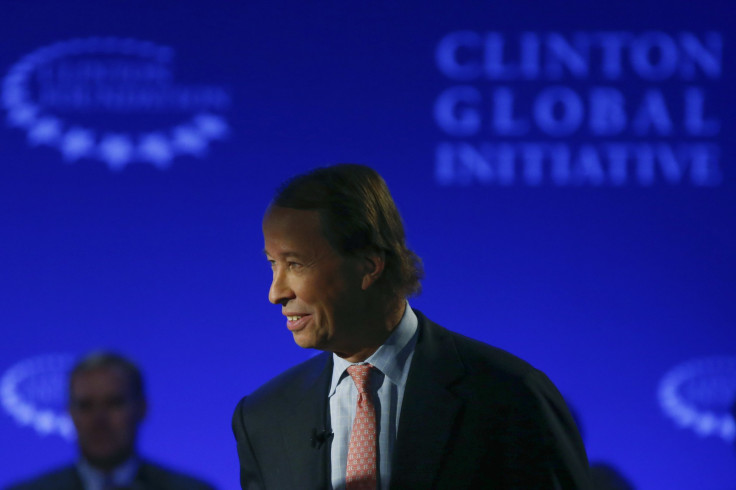
While proponents tout the public-private partnership concept as a win-win for government and business, critics charge that Trump’s proposal is designed primarily to help Blackstone and the financial industry.
“The program seems more about rewarding private-equity investors than about rebuilding America’s crumbling infrastructure,” wrote Princeton University economists Alan Blinder and Alan Kreuger in the Wall Street Journal.
Watchdog groups assert that Chicago’s experience privatizing its parking meters and Indiana’s experience privatizing a major highway are among the many cautionary tales that illustrate why the P3 model should be avoided.
“They get control and they get power over things that really matter,” Donald Cohen, the executive director of the advocacy group In the Public Interest, said of the companies that take ownership of what are normally public projects for P3s. “And we are contractually obligated to keep them happy.”
“We Will Eliminate The Carried Interest Deduction”
Schwarzman has long been one of the leading opponents of proposals to prevent private equity executives from continuing to classify large portions of their compensation as capital gains rather than regular income. In practice, private equity moguls often classify the fees they charge clients on investment gains not as income, but as “carried interest” — thereby paying the lower capital gains tax rate. Bloomberg has reported that if the scheme were outlawed, Schwarzman would personally have to pay millions more in taxes. The Blackstone CEO has reportedly called one private equity executive a “traitor” for supporting efforts to close the loophole.
In theory that stance puts Schwarzman at odds with Trump, who — along with Hillary Clinton — declared his support for taxing private equity executives’ compensation as regular income.
“We will eliminate the carried interest deduction and other special interest loopholes that have been so good for Wall Street investors, and for people like me, but unfair to American workers,” Trump said during an August campaign speech in Detroit.
That fiery rhetoric, though, is nowhere to be found now that Trump is president and Schwarzman is helping oversee the administration’s economic policies. Treasury Secretary Steve Mnuchin — another private equity executive — recently said the administration conceptually supports closing the loophole, but also said the administration is concerned about possible harm to the economy.
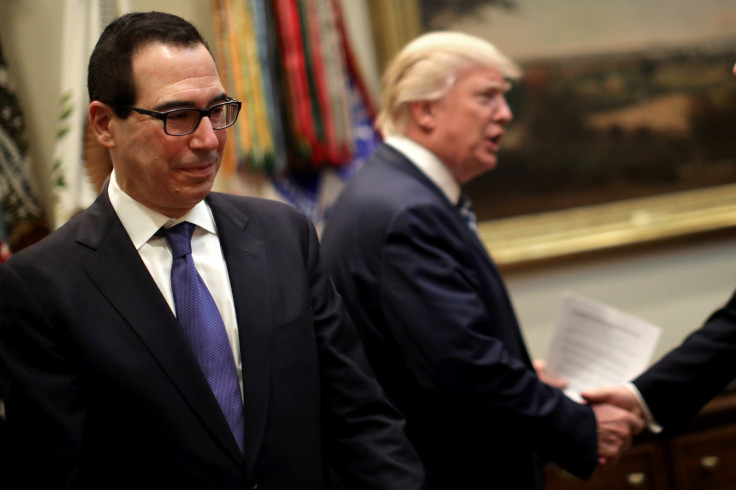
“We want to tax hedge funds,” Mnuchin told Axios co-founder Mike Allen in March.
“We’ll look at carefully what the impact is to other areas so we don’t disincentivize very important investment by pension funds and state funds and lots of other institutional investors,” Mnuchin said. “I think you know the president wants to spend a trillion dollars on infrastructure, and a significant component of that we expect to be funds by private enterprise.”
Under existing law, Trump may not need congressional action to close — or at least limit — the loophole. Some tax code experts have argued that the Treasury Department could use its regulatory authority to close it right now. But Trump has not commented on the issue in months, and the White House has not released a plan to close the loophole.
The tax scheme is no small issue: The nonpartisan Congressional Budget Office in 2013 estimated the elimination of the loophole would generate $17.4 billion in new public revenues over ten years. But as Bloomberg’s Sahil Kapur points out, the real amount could be much higher: law professor Victor Fleischer has estimated taxing carried interest at regular rates could create an additional $180 billion in tax revenue over the same period.
Defenders of the loophole argue that it is inherently fair to tax Wall Street moguls’ compensation at the lower capital gains rate because, they say, private equity firms have an ownership stake in the underlying investments.
“There is a lot of blind and unthinking anger in the world,” wrote private equity executive Steven Klinsky in a recent New York Times op-ed. “Wall Street is an easy political punching bag, and carried interest is an easy issue to be a demagogue over. The fact, though, is that there is no special loophole for private equity and never has been.”
By contrast, critics say that letting money managers pay the lower capital gains rate on earnings made with other people’s money is an egregious abuse of the tax code.
“That makes about as much sense as the guy you hired to mow your lawn claiming he’s your partner in helping to get your house ready to sell, so he should pay taxes on the lawn-mowing income at the long-term capital gains rate that you get from selling your building,” said Morris Pearl, former managing director at BlackRock Inc. and chair of the Patriotic Millionaires. “We just think this is the poster child for egregious tax loopholes.”
Blackstone doesn’t see it that way. In its February SEC filings, the company suggested that firm executives need to continue paying a reduced tax rate in order to keep Blackstone employees working hard at their jobs.
“[If]legislation to treat carried interest as ordinary income rather than as capital gain for tax purposes were to be enacted,” the firm wrote, “we and possibly our unitholders would be required to pay a materially higher amount of taxes, thereby adversely affecting our ability to recruit, retain and motivate our current and future professionals.”
Update 4/20; 5:20 p.m.: This story was updated to clarify that attorney Joshua Lichtenstein of Ropes & Gray was speaking to IBT about the potential impact of the fiduciary rule on the alternative investment industry in general, not any particular firm.
© Copyright IBTimes 2024. All rights reserved.






















